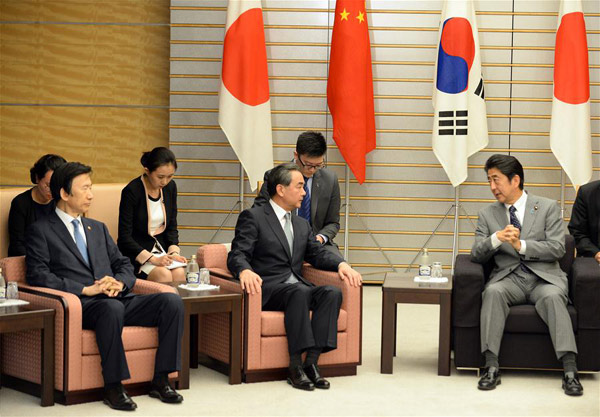 时刻新闻
时刻新闻

TOKYO - China welcomes Japan as a Group of 20 (G20) member to play a positive and constructive role in making the upcoming G20 Hangzhou Summit a success, Chinese Foreign Minister Wang Yi said here on Wednesday.
Wang made the remarks as he met with Japanese Prime Minister Shinzo Abe together with his Japanese and South Korean counterparts following a trilateral foreign ministers' meeting.
Wang said that the foreign ministers' meeting, held at a time when bilateral relations between China, Japan and South Korea were all faced with obstacles, maintained the keynote and momentum of trilateral cooperation.
To promote trilateral cooperation, China has put forward a "four-wheel drive" proposal, namely, to promote cooperation in four key areas, including politics, economy and trade, culture as well as sustainable development, said Wang.
He added that China welcomes Abe to attend the G20 Summit in Hangzhou, and China is willing to see Japan, as a member of G20, to play a positive and constructive role in making the summit a success.
It is hoped that the three sides could, in the spirit of facing history squarely and advancing toward the future, strengthen cooperation and make joint efforts to promote regional peaceful development and improve bilateral relations, said the Chinese foreign minister.
Abe, for his part, stressed the importance of trilateral cooperation and expressed the hope that the three countries could, based on the fruits of the foreign ministers' meeting, make active preparation for bringing forth a trilateral summit within the year, improve bilateral relations and promote regional development.
He said that Japan is willing to promote mutual trust and enhance dialogue with China, to make efforts to control differences and build a future-oriented China-Japan relationship.
Abe added the upcoming G20 Summit is of great significance to sustainable development of world economy and Japan wishes the summit a success and is willing to provide all possible help for the meeting, he said.
On Wednesday, Wang also met with Toshihiro Nikai, secretary-general of Japan's ruling Liberal Democratic Party, and Yohei Kono, head of the Japanese Association for the Promotion of International Trade and former president of LDP and former Japanese Prime Minister Yasuo Fukuda, respectively.
Wang told Nikai that China-Japan relations are at an important juncture and would either move forward or backward.
He expressed the hope that Nikai, who has witnessed twists and turns in the bilateral relationship, could, together with friendly Japanese people, continue to promote non-governmental exchanges between the two countries to make new contributions to the development of bilateral relations.
Nikai, for his part, said that China-Japan relationship is vital to Japan's future development and the two countries should enhance people-to-people exchanges as well as exchanges between political parties and the young people to promote bilateral ties.
In his meeting with Kono, Wang said that people of vision in the two countries should, based on a sense of historical mission, consolidate political basis of bilateral relations and realize benign interaction between the two countries and pass on friendly relationship to future generations.
Kono said that the two countries should maintain friendly traditions and make wise decisions in accordance with long-term interests of the two peoples, adding that Japan should actively respond to China's Belt and Road Initiative, which is beneficial not only to Japan, but also to neighboring countries.
In his meeting with Kukuda, Wang said that China-Japan relations are currently faced with both challenges and opportunities. The two sides should abide by the principles defined in the four political documents and implement the four-point principled agreement to make differences controllable and to strengthen cooperation in various areas to enhance bilateral relations.
He expressed the hope that the Japanese people could view China's development from a proper perspective, make use of the opportunities provided by China's development and continue to promote bilateral ties.
Fukuda said that Japan and China, as the third and second largest economy in the world, respectively, play significant roles in the world. Promoting bilateral ties is not only in the interests of the two countries, but also the common expectation of regional countries.
He hoped that the two sides could continue to enhance dialogue and communication, properly handle disputes, expand practical cooperation and bring benefits to the peoples of the two countries.



